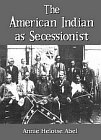- per page
This book has been purposely given a sub-title, in order that the peculiar position of the Indian, in 1861, may be brought out in strong relief. He was enough inside the American Union to have something to say about secession and enough outside of it to be approached diplomatically. It is well to note, indeed, that Albert Pike negotiated the several Indian treaties that bound the Indian nations in an alliance with the seceded states, under the authority of the Confederate State Department
The report of Blue Bonnet's ranch party had spread like wildfire through the town, and the going away of so many of its most prominent citizens to far-off Texas, had aroused quiet Woodford to a pitch of excitement equalled only by that of a prohibition election, or a visit from the President.
In the series commencing with the present volume GUSTAVE AIMARD has entirely changed the character of his stories. He has selected a magnificent episode of American history, the liberation of Texas from the intolerable yoke of the Mexicans, and describes scenes quorum pars magna fuit.
The cloud which for the space of a month hung gloomily over the civilized world, black with far worse evils than those of simple war, has passed from over our heads without bursting.
Long time since this hand hath penned a preface. Now only to say, that this romance, as originally published, was written when the author was suffering severe affliction, both physically and mentally-the result of a gun-wound that brought him as near to death as Darke's bullet did Clancy.
This was not the first time he had been broke. On the contrary, during his younger days he had more than once found himself in that condition and had looked upon it as an exciting experience, as a not unpleasant form of adventure. To be strapped in a mining camp, for instance, was no more than a mild embarrassment. But to find oneself thirty-eight years old, friendless and without funds in a city the size of Dallas-well, that was more than an adventure, and it afforded a sort of excitement that he believed he could very well do without.
Primarily the struggle of the Texans for freedom did not form a part of our war with Mexico, yet this struggle led up directly to the greater war to follow, and it is probably a fact that, had the people of Texas not at first accomplished their freedom, there would have been no war between the two larger republics.
Apart from the thrilling interest of Aimard's new story, which I herewith offer to English readers, I think it will be accepted with greater satisfaction, as being an historical record of the last great contest in which the North Americans were engaged. As at the present moment everything is eagerly devoured that may tend to throw light on the impending struggle between North and South, I believe that the story of "THE FREEBOOTERS," which is rigorously true in its details, will enable my readers to form a correct opinion of the character of the Southerners.
General Custer was given scant time, after the last gun of the war was fired, to realize the blessings of peace. While others hastened to discard the well-worn uniforms, and don again the dress of civilians, hurrying to the cars, and groaning over the slowness of the fast-flying trains that bore them to their homes, my husband was almost breathlessly preparing for a long journey to Texas.
Away to her left lay the yellow flood of the Rio Grande, but the woman, though tempted to swing in that direction, knew better than to yield. At least twenty miles of barrens lay between, and she told herself that she could never cover such a distance. No, the water-hole was nearer; it must be close at hand.
Together, man and mount made a striking picture; yet it would have been hard to say which was the more picturesque-the rider or the horse. The latter was a splendid beast, and its spotless hide of snowy white glowed in the rays of the afternoon sun. With bit chains jingling, it gracefully leaped a gully, landing with all the agility of a mountain lion, in spite of its enormous size.
It may seem strange to you that out of all the stories I heard on the Rio Grande I should choose as first that of Buck Duane-outlaw and gunman. But, indeed, Ranger Coffee's story of the last of the Duanes has haunted me, and I have given full rein to imagination and have retold it in my own way. It deals with the old law-the old border days-therefore it is better first.
As my readers will eventually discover, many daring deeds did we perform together, and many pleasant days did we pass, both in the northern cities of Mexico and western prairies of Texas, hunting with the Comanches, and occasionally unmasking some rascally Texans, who, under the paint of an Indian, would commit their murders and depredations upon the remote settlements of their own countrymen.
The vital question is whether a national union was established by the States, or a confederacy of independent nations formed with the right of each to decide upon the validity of the acts of the General Government and leave it at its pleasure.
A History of the Six Attempts During the First Century of the Republic
- per page

























